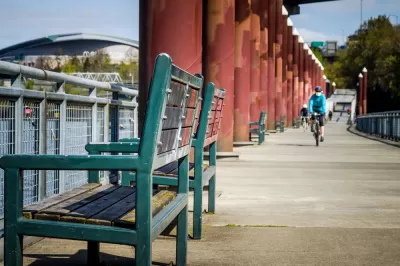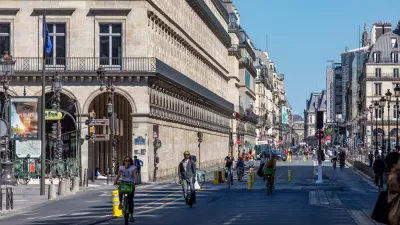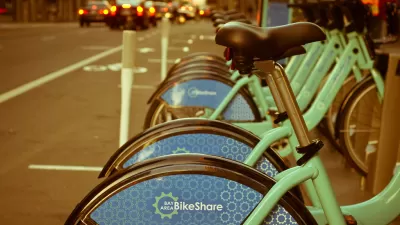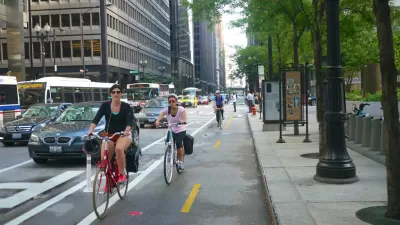"Anytime the city does something to dramatically improve streets for people and limit car access...it’s hard to take them back."

Kristian Foden-Vencil reports on the ongoing bike boom in Portland, and its likelihood of persisting beyond the pandemic.
The story is obviously focused on Portland's unique culture, where a bike boom is measured in group rides focused on Pickles, Star Trek, crossing bridges, and being naked. But, there have been more run-of-the-mill signs of biking's popularity during the pandemic:
At the height of the pandemic, the streets were so full of bikes, the city had to do something. It launched a ‘Slow Streets’ program and put plastic bollards and signs across 100 miles of streets to make them bike and pedestrian-friendly.
While an official count is "elusive," according to the article, Foden-Vencil cites Bike Portland editor Jonathan Maus to make the case that the bike boom is likely to stick around in Portland.
“Anytime the city does something to dramatically improve streets for people and limit car access...it’s hard to take them back because, guess what, people love having a healthier quieter, more humane way to get around,” Maus said.
While the Oregon Department of Transportation recently announced $55 million in funding for pedestrian and bike infrastructure, and the "Infrastructure Investment and Jobs Act" recently passed by the Senate could include big sums of money for bike infrastructure if it achieves full approval in the House, Maus also argues that it will take more than money for bikes to help significant numbers of people ditch cars for bikes—it will also take less spending on car infrastructure (an orientation that the Oregon Department of Transportation hasn't yet abandoned, despite its $55 million promise).
FULL STORY: Will the bicycling boom survive after the pandemic?

Planetizen Federal Action Tracker
A weekly monitor of how Trump’s orders and actions are impacting planners and planning in America.

Congressman Proposes Bill to Rename DC Metro “Trump Train”
The Make Autorail Great Again Act would withhold federal funding to the system until the Washington Metropolitan Area Transit Authority (WMATA), rebrands as the Washington Metropolitan Authority for Greater Access (WMAGA).

The Simple Legislative Tool Transforming Vacant Downtowns
In California, Michigan and Georgia, an easy win is bringing dollars — and delight — back to city centers.

The States Losing Rural Delivery Rooms at an Alarming Pace
In some states, as few as 9% of rural hospitals still deliver babies. As a result, rising pre-term births, no adequate pre-term care and harrowing close calls are a growing reality.

The Small South Asian Republic Going all in on EVs
Thanks to one simple policy change less than five years ago, 65% of new cars in this Himalayan country are now electric.

DC Backpedals on Bike Lane Protection, Swaps Barriers for Paint
Citing aesthetic concerns, the city is removing the concrete barriers and flexposts that once separated Arizona Avenue cyclists from motor vehicles.
Urban Design for Planners 1: Software Tools
This six-course series explores essential urban design concepts using open source software and equips planners with the tools they need to participate fully in the urban design process.
Planning for Universal Design
Learn the tools for implementing Universal Design in planning regulations.
Smith Gee Studio
City of Charlotte
City of Camden Redevelopment Agency
City of Astoria
Transportation Research & Education Center (TREC) at Portland State University
US High Speed Rail Association
City of Camden Redevelopment Agency
Municipality of Princeton (NJ)





























